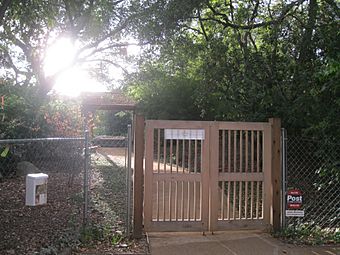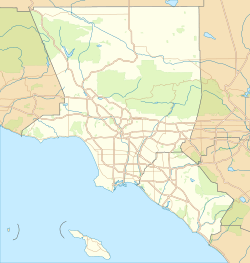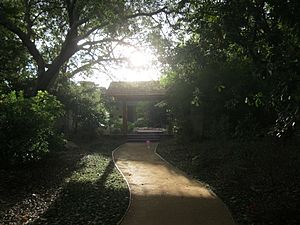Storrier-Stearns Japanese Garden facts for kids
Quick facts for kids |
|
|
Storrier-Stearns Japanese Garden
|
|

The entrance to the garden
|
|
| Location | 270 Arlington Dr., Pasadena, California |
|---|---|
| Area | 1.5 acres (0.61 ha) |
| Built | 1937 |
| Architect | Kinzuchi Fuji |
| Architectural style | Japanese |
| NRHP reference No. | 05000050 |
| Added to NRHP | February 15, 2005 |
The Storrier-Stearns Japanese Garden is a beautiful Japanese garden found in Pasadena, California. It is located at 270 Arlington Drive. This special garden was created by Charles and Ellamae Storrier Stearns. They hired Kinzuchi Fujii, a talented Japanese landscape designer.
Work on the garden began in 1935 and took seven years to complete. The design itself took about four years. This amazing garden covers about 1.45 acres (0.59 ha) of land. It cost $150,000 to build.
Contents
Discovering the Garden's Design
The Storrier-Stearns Japanese Garden is a "Hill and Pond Strolling Garden." This style is also known as "chisen kaiyu shiki." It is designed for people to walk through and enjoy. This type of garden always has water features and paths.
What You Will See
This garden has many cool features. It includes ponds that are 25-foot (7.6 m) long. There are also pretty waterfalls. You will find hills, bridges, and winding paths. Many parts of the garden came from Japan. These include the teahouse and items made of granite, bronze, and wood.
The Teahouse: A Special Place
The garden's teahouse was very important. It became a landmark for the Japanese community in Pasadena. People used it as a meeting place. Many Japanese cultural activities took place there. Sadly, the original teahouse burned down in 1981.
Rebuilding the Teahouse
The teahouse was rebuilt to look just like the original. This happened during a recent restoration of the garden. Takeo Uesugi, a famous landscape architect, led this work.
Visiting the Garden
The Storrier-Stearns Japanese Garden is open to the public. During the pandemic, you can visit it on the last Sunday of every week. It is a peaceful place to explore.
A Historic Landmark
The garden is recognized as a special place. It was added to the National Register of Historic Places on February 15, 2005. This means it is an important historical site.





